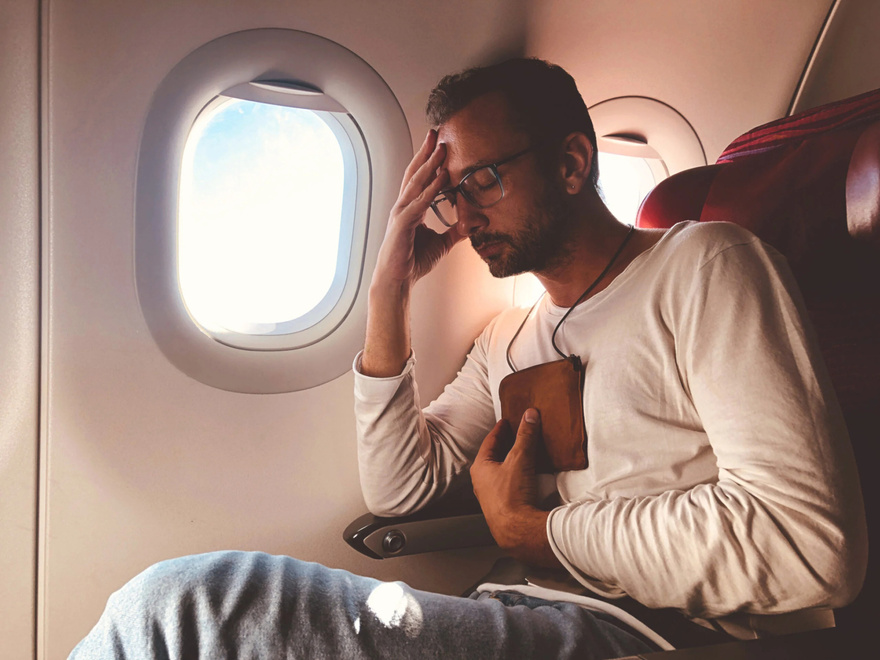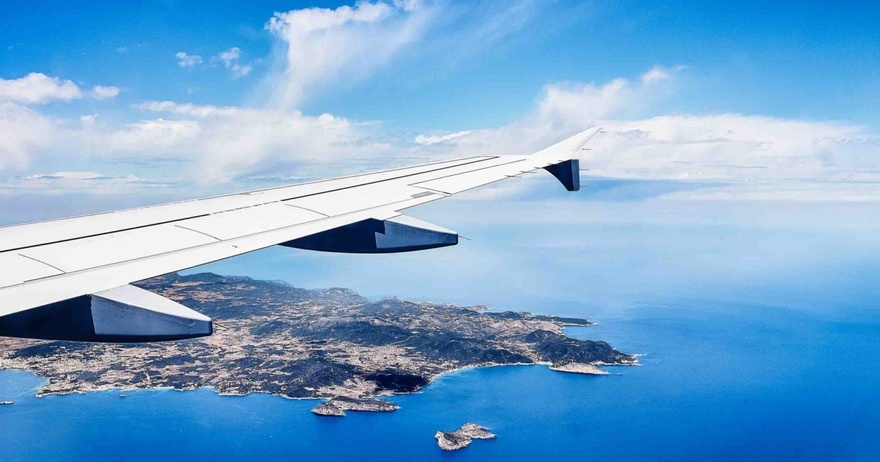How many trips have you avoided just to stay grounded? How often have you found yourself ready to confront your fear of flying, only to back out at the last moment when that “knot in your stomach” becomes unbearable? If you’ve never experienced this, it may be hard to fully grasp just how paralyzing the fear of flying—known as aerophobia—can be. People with this anxiety often feel trapped, unable to fulfill their desires or travel freely, as something bigger than themselves seems to dictate their lives.

While the clinical diagnosis of aerophobia, a specific phobia of flying, is relatively rare—affecting about 2.5% of the population—general anxiety about flying is much more common. Some travelers worry about mechanical failures or the possibility of a crash. Others may feel uneasy about germs and viruses in crowded spaces, while some are anxious about the stress that flying may trigger. Whatever the root cause, the fear of flying is a real and challenging issue for millions of people. Fortunately, there are strategies you can use to overcome this fear, allowing you to take to the skies with greater ease.
Understanding the Fear of Flying
Fear of flying can manifest in different ways for different people. Some may experience mild anxiety that builds up before the flight, while others may have full-blown panic attacks that make it nearly impossible to board a plane. The anxiety can be triggered by a variety of factors, including:
- A lack of control: When you’re on an airplane, you’re entirely in the hands of the pilots and the aircraft’s technology. For many, this loss of control can create intense anxiety.
- Fear of heights (acrophobia): Some individuals who are afraid of flying also suffer from acrophobia, the fear of heights, which makes the idea of being miles above the ground unbearable.
- Turbulence: Many passengers fear turbulence, mistaking it as a sign of imminent danger, even though turbulence is a normal and usually harmless part of flying.
- Claustrophobia: The confined space of an airplane cabin can cause discomfort and panic, especially for those who are claustrophobic.
- Previous trauma: Some people have had frightening experiences with flying or have been affected by news stories of air disasters, which trigger anxiety.
While these triggers may vary, the result is often the same: negative thoughts, physical symptoms like sweating and rapid heartbeat, and an overwhelming sense of dread.

Common Myths About Flying
One of the reasons why fear of flying persists is because of common myths and misunderstandings about air travel. Here are a few myths to debunk:
- Myth 1: Flying is dangerous.
In reality, flying is one of the safest modes of transportation. According to the Federal Aviation Administration (FAA), the odds of being involved in an airplane accident are 1 in 11 million. Furthermore, even in the rare case of an accident, about 96% of passengers survive. Statistically, you’re far more likely to be injured in a car accident on the way to the airport than in the air. - Myth 2: Turbulence is a sign that the plane is in trouble.
Turbulence is completely normal and poses little to no risk to an aircraft. Pilots are trained to handle turbulence, and modern planes are designed to withstand far more than the bumps and jolts you experience. - Myth 3: Plane crashes are not survivable.
Thanks to advances in technology and safety protocols, the vast majority of airline incidents are survivable, as demonstrated by the high survival rates. -

Practical Tips to Overcome Flight Anxiety
Whether you have a clinical fear of flying or simply experience anxiety during air travel, there are several strategies that can help you cope with the stress.
1. Knowledge is Everything
One of the most effective ways to combat fear is to educate yourself. Many people fear flying because they don’t understand how planes work or how safe they are. Learning more about aviation, flight safety, and the procedures that pilots and airlines follow can ease your mind. For instance, knowing that planes undergo rigorous safety checks before every flight or that pilots receive extensive training on how to handle emergencies can help reduce anxiety.
A great place to start is by understanding the physics behind flight. Planes are meticulously designed to fly at high altitudes, and they are engineered with multiple backup systems for safety. The more you know about how airplanes operate, the less mysterious and terrifying flying will seem.
2. Use the Substitution Method
The human brain is powerful, but it can also be reprogrammed to think differently. If you’re prone to anxious thoughts like “I’m afraid the plane will crash,” try replacing them with more realistic and positive statements. For example, you might say, “I know flying makes me nervous, but the plane is incredibly safe, and I’m in good hands.” Repeat these affirmations whenever negative thoughts creep in. Over time, you can condition your mind to focus on positive, rather than fearful, outcomes.
Start practicing these substitutions a few days before your flight so that by the time you board, you’re already prepared to counteract your anxiety with more helpful thoughts.
3. Distract Yourself
Anxiety often grows when you focus solely on the fear. One way to combat this is to keep your mind occupied. Before your flight, create a list of activities you can do during the journey. Bring a book, download a movie, or prepare a playlist of your favorite songs. If you like puzzles, bring a crossword or Sudoku book to keep your brain engaged.
The idea is to immerse yourself in something enjoyable so that your mind doesn’t have the space to fixate on fear. Remember, your brain cannot fully engage with two things at once, so by focusing on something else, you can help diminish the power of your anxious thoughts.
4. Focus on Your Destination
Sometimes it helps to think beyond the flight itself and focus on the bigger picture. Remind yourself why you’re traveling—whether it’s for a vacation, to see loved ones, or for an important work event. Picture yourself at your destination, enjoying the experiences that await you. This mental shift from the fear of the journey to the excitement of the destination can help to reduce anxiety.
Visualize the positive emotions you’ll feel when you arrive, whether that’s relaxing on a beach or reuniting with family. By focusing on the joy of reaching your destination, you can create a sense of purpose that helps counterbalance your fear.
5. Do a Mental Simulation
Preparing for a flight mentally can ease anxiety. A few days before your flight, imagine the entire process—from arriving at the airport to sitting on the plane and landing safely at your destination. Visualize everything going smoothly and pair these mental images with positive emotions.
Much like pilots use simulators to prepare for real-life flying conditions, you can mentally rehearse the experience of flying. By the time you board the plane, it will feel like you’ve already experienced the flight in a safe, controlled way.
6. Train Yourself to Breathe
Breathing exercises can be incredibly effective in calming your nerves during a flight. Deep breathing increases the flow of oxygen to your brain, stimulating your parasympathetic nervous system, which promotes relaxation. Try this simple exercise: inhale deeply through your nose, allowing your belly to expand, then exhale slowly through your mouth. Repeat this process until you feel calmer.
There are also several apps designed to guide you through breathing exercises and meditation, helping you stay relaxed throughout your journey.
7. Avoid Caffeine
Caffeine can increase your heart rate and exacerbate anxiety symptoms. Before and during your flight, it’s best to avoid coffee, energy drinks, or any other caffeinated beverages. Instead, opt for calming alternatives like chamomile tea or water. Staying hydrated and calm will help reduce physical symptoms of anxiety.

Conclusion: Taking Control of Your Fear
The fear of flying, while common, doesn’t have to control your life. By understanding the root of your anxiety and employing practical coping strategies, you can gradually overcome your fear. Whether you start by educating yourself about flight safety, practicing mindfulness and breathing exercises, or simply finding effective distractions, the key is to take small, manageable steps toward confronting your fear. With time and persistence, you can transform flying from a source of dread into an experience of empowerment.
Blake Shelton Reveals the ‘Key to Happiness’ with Gwen Stefani After 10 Years Together
76-year-old man, paralyzed from polio at 6, was one of the last people with an iron lung: ‘My life is incredible’
The unbelievable story of Amanda Scarpinati moves me to tears
The husband spent a week on the coast with an “acquaintance,” and when he came back, he was stunned by what he saw.































